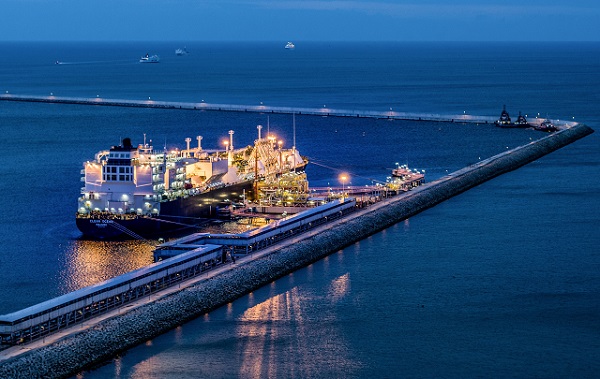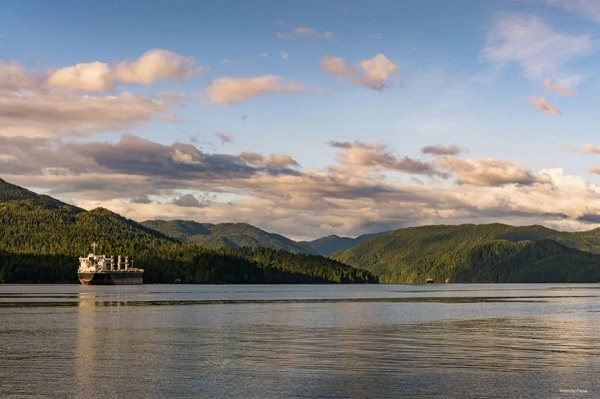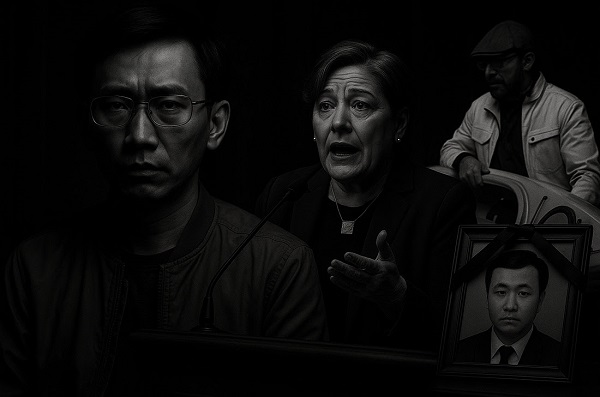Energy
US LNG uncertainty is a reminder of lost Canadian opportunities

From Resource Works
Canada has missed opportunities to supply Europe with LNG due to political missteps and regulatory barriers, despite having the resources and potential.
For almost three years now, Europe has not been able to figure out how it will replace the cheap, plentiful supply of Russian gas it once enjoyed. Since Russia invaded Ukraine, the EU member states have made drastic moves to curtail their reliance on Russian energy, specifically Russian gas.
In an ideal world, the diversification of the EU’s energy supply would have been Canada’s golden opportunity to use its vast LNG capabilities to fill the gap.
Canada has all the right resources at its disposal to become one of the EU’s premier energy sources, with enormous natural gas reserves lying in the ground and shores upon three of the world’s four oceans. The problem is that Canada lacks both the right infrastructure and the necessary political will to get it built.
The fact that Canada is not a favored supplier of LNG to Europe is the consequence of political missteps and a lack of vision at the highest levels of government. It was reported by the Financial Times that outgoing United States President Joe Biden’s freeze on new LNG export permits and clashes with activists have created uncertainty over future supply growth.
Missteps and onerous regulatory barriers have kept Canada shackled and unable to reach its full potential, leaving us on the sidelines as other countries take the place that should have been Canada’s as an energy supplier for the democratic world.
To this day, European leaders like Greek Prime Minister Kyriakos Mitsotakis, German Chancellor Olaf Scholz, and Polish President Andrzej Duda have indicated their openness to adding Canadian LNG to their domestic supply.
However, no plans for supplying Canadian LNG to Europe have come to fruition. The absence of any commitment from the federal government to take those possibilities seriously is the result of decisions that now look like major mistakes in hindsight.
Two of these are cancelled energy projects on the Atlantic coast: the Energy East oil pipeline and the proposed expansion of an LNG terminal in New Brunswick.
Canada’s Pacific coast is now a hub of LNG development, with three planned facilities well underway, and there are hungry markets in Asia ready to receive their products. It is a shame that the Atlantic coast is being left behind during Canada’s burgeoning LNG renaissance. The economic situation in the Maritimes has long been challenging, leading to emigration to the Western provinces and stagnation back at home.
LNG projects in British Columbia have proven to be job machines and drivers of economic revitalization in formerly impoverished regions that were gutted when fishing, mining, and forestry went downhill in the 1980s.
The potential to both help Atlantic Canada level back up economically while becoming the bridge for energy exports to Europe was halted by the cancellation of the Energy East pipeline and a proposed LNG terminal in Saint John, New Brunswick.
Proposed by TransCanada (since renamed to TC Energy) to the National Energy Board in 2014, Energy East would have been a 4,600-kilometer pipeline with the capacity to transport over a million barrels of crude oil from Alberta to refineries in New Brunswick and Quebec. While it is true that Europe is more interested in LNG than crude oil, the completion of one great project encourages more and could have gotten the ball rolling on further energy infrastructure.
Had Energy East been constructed, it would have served as a symbol to investors and energy industry players that Canada was serious about west-to-east projects. Unfortunately, in 2017, TransCanada withdrew from the project due to regulatory disagreements and uncertainty.
In 2019, the federal government passed Bill C-69, AKA the “no more pipelines” law, leading to even more complex and restrictive regulations for new energy projects. When there should have been momentum on energy infrastructure building, there came only more cascading bad news.
A proposed expansion of Repsol’s LNG terminal in Saint John, New Brunswick, another potential gateway for Canadian energy to get through to Europe, was abandoned due to the projected high costs and poor business case.
The idea of LNG on the East Coast making for a poor business case has been repeated by the federal government many times. However, in documents accessed by The Logic, it was revealed that Global Affairs Canada has, in fact, stated the opposite, and that there was great potential to increase rail and pipeline networks on the Atlantic.
Furthermore, Canada is capable of shipping LNG from the Western provinces to the East Coast because of our access to the vast pipeline networks of the United States.
As a result of these regrettable decisions, Canadians can only watch as lost opportunities to provide LNG to the democratic world are filled by other countries. Every downturn or disruption in the energy exports of other countries is a sore reminder of Canada’s lost opportunities.
Canada needs more vision, certainty, and drive when it comes to building the future of Canadian energy. In the words of Newfoundland and Labrador Premier Andrew Furey, “We will be all in on oil and gas for decades and decades to come…because the world needs us to be.”
Energy
The Trickster Politics of the Tanker Ban are Hiding a Much Bigger Reckoning for B.C.

From Energy Now
By Stewart Muir
For years, a conservation NGO supported by major foreign foundations has taken on the guise of Indigenous governance authority on British Columbia’s north coast. Meanwhile, rights-holding First Nations with an economic agenda are reshaping the region, yet their equal weight is overlooked. A clash of values has resulted.
For more than a decade, British Columbians have been told — mostly by well-meaning journalists and various pressure groups — that an organization called Coastal First Nations speaks with authority for the entire coast. The name sounds official. It sounds governmental. It sounds like a coalition of Indigenous governments with jurisdiction over marine waters.
It isn’t any of those things.
Coastal First Nations (CFN) is a non-governmental organization, incorporated under the BC Societies Act as The Great Bear Initiative Society. It doesn’t hold Indigenous rights or title. It has no legislated role to provide benefits or services to First Nations members. It has no jurisdiction over shipping, marine safety, forestry, fisheries, energy development, or environmental regulation. Yet its statements are frequently treated as if they carry the weight of sovereign authority.
It’s time to say out loud what many leaders — municipal, Indigenous, and industry — already know: CFN is an advocacy group, not a government. Case in point, a recent news story with the following lede: “B.C.’s Coastal First Nations say they will use ‘every tool in their toolbox’ to keep oil tankers out of the northern coastal waters.” A spokesperson claimed to represent “the Rights and Title Holders of the Central and North Coast and Haida Gwaii,” yet notwithstanding the rights of any individual First Nation, CFN does not hold any formal authority.
Here’s why this matters. The truth is, Alberta has already struck its grand bargain with the rest of Canada. Now it’s time to confront the uncomfortable truth that the country is still one bargain short of a functioning national deal.
In 2026, with Canadians increasingly alert to who is shaping national conversations, there is a reasonable expectation that debates affecting our economic future should be led and conducted by Canadians — not by foreign foundations, not by out-of-country campaign strategists, and not by NGOs built to advance someone else’s policy objectives.
Where the confusion came from
CFN’s rise in public visibility traces back to the “Great Bear Rainforest” era, when U.S. philanthropic foundations poured large sums of money into environmental campaigns in British Columbia. A Senate of Canada committee document notes that the Gordon & Betty Moore Foundation alone provided approximately $25 million directly to Coastal First Nations, delivered as twenty-five nearly $1 million installments.
CFN also played a central role in the Great Bear Rainforest negotiations, which were financed by a coalition of foreign philanthropies including the Packard Foundation, Hewlett Foundation, Wilburforce Foundation, Rockefeller Brothers Fund, Nature Conservancy/Nature United, and Tides Canada Foundation. These foundations collectively contributed tens of millions of dollars to the “conservation financing” model that anchored CFN’s operating environment.
This history isn’t speculative. It’s well documented in foundation reports, Canadian Parliamentary evidence, and the publicly disclosed financial architecture behind the Great Bear Rainforest. For a generation, well-funded U.S. environmental campaigns have worked to make Canadians afraid of their own shadow by seeding doubt, stoking paralysis, and teaching a resource nation to second-guess the very wealth that built it.
Between 2010 and 2018, an independent forensic accounting review by Deloitte Forensic (backed by the Alberta government) found that foreign foundations provided roughly $788.1 million in grants for Canadian environmental initiatives. The largest single category — by a wide margin — was marine-based initiatives, totalling $297.2 million. In Deloitte’s categorization, “marine-based” overwhelmingly refers to coastal campaigns: Great Bear Rainforest–related advocacy, anti-tanker/shipping activism, marine-use regulation campaigns, marine ecological programs, and other coastal political work.

Land-based initiatives were the second-largest category ($191 million), followed by wildlife preservation ($173 million).
The forensic review also showed that of the $427.2 million that physically entered Canada, 82% — approximately $350.3 million — was spent in British Columbia, with the dominant share directed specifically toward coastal and marine initiatives.
Taken together, these findings confirm that foreign-funded environmental activity in Canada has been geographically concentrated in British Columbia and thematically concentrated on the coast – exactly the domain where CFN has been positioned as a public-facing authority.
The real authority lies with the nations themselves
If British Columbians want to understand who truly governs the coast, they should look to the Indigenous governments that hold rights, title, citizens, and accountability — not NGOs that comment from the sidelines. That means not overlooking:
- Haisla Nation, leaders of Cedar LNG
- Nisga’a Nation, co-developers of Ksi Lisims LNG
- Gitxaala Nation, asserting legal and territorial authority
- Kitselas and Kitsumkalum, both shaping regional development
These governments are also coastal First Nations. They negotiate major economic partnerships, steward lands and waters, and make decisions grounded in their own legal orders. Moreover, representation is the key measure of accountability in a democracy: First Nations governing councils are elected by their members. The CFN is not elected. The nations are accountable to their own people — not to U.S. philanthropies or to the strategic objectives of foreign-backed environmental campaigns.
The Haisla Nation once belonged to CFN, but quit in protest in 2012 when the body opposed LNG. The Haisla council went on to fully embrace economic development via liquefied natural gas and own the upcoming Cedar LNG project.
Meanwhile, the central and northern coastal regions where CFN has opposed numerous economic opportunities continue to suffer the worst child poverty in British Columbia.
In the delicate politics of the region’s First Nations alliances, relationships are constantly in motion and governed by inviolable traditions of mutual respect. From these threads, it has to be said that the CFN’s strategy of weaving the appearance of unanimity is truly a fabrication. In point of fact, CFN represents just one half of the story. My data source tells the story, by drawing together the latest available economic and demographic information for 216 British Columbia First Nations:
- Status Indian residents of CFN communities on the north coast number 5,484, with a total membership near and far of 20,447.
- The pro-development group noted earlier numbers 5,505 living local out of a total membership of 16,830.
In other words, virtually equal. Hence it’s obvious that any media report citing CFN as the singular authority for local First Nations interests is a misleading one. CFN speaks for only a slice of the North Coast, not the whole, and the numbers make that impossible to ignore.
When a CFN motion opposing responsible resource development was adopted by the Assembly of First Nations (see Dec. 2 news), it was further evidence that the deck is stacked against First Nations that are accountable and position themselves as having broad responsibilities, including but not limited to raising the standard of living of their members.
The future belongs to the nations
The politics of LNG on the North Coast can’t be grasped without staring directly at the tanker ban — not as scripture, but as the political curiosity it has become. Anyone who knows these waters understands it’s mostly theatre: it doesn’t question letting Alaska oil tanker ships transit our exclusive economic zone when we cannot, and it doesn’t touch the real risks coastal people actually worry about. Yet waving it away is naïve. The ban behaves like a trickster spirit in our public life — capricious, emotionally loaded, and capable of turning a routine policy debate into a cultural conflagration with barely a flick of its tail.
This is why Coastal First Nations retain such gravitational pull. For years, the ban has served as the moral architecture of their Great Bear Sea campaign. CFN represents a long-game strategy — build legitimacy, occupy the moral high ground, and shape the destiny of a nation by holding the symbolic centre. Their concerns seem genuine and rooted in lived stewardship – yet were shaped by Madison Avenue minds hired by American philanthropists to affect our politics. But a near equal number of coastal nation residents unified by a different outlook also have skin in the game. They are charting futures grounded in prosperity, environmental care, and sovereignty on their own terms, and their authority is the real thing — born of title, law, and accountability to their own people.
And here is the irony worth heeding: the tanker ban’s pageantry masks a solution. It is dragging into daylight a conversation the province has avoided for decades — a conversation that will soon prove inevitable as court rulings unsettle the very foundation of property rights in British Columbia. This is the hinge that the moment turns on.
Canada cannot resolve its growing national contradictions without moving its energy to global markets. Alberta has already made its grand bargain with the country. Now British Columbia must craft its own — harnessing the prosperity of energy development to discharge political debts and finally settle the title question that has defined the province’s modern era.
Stewart Muir
Economy
What the Data Shows About the New Canada-Alberta Pipeline Opportunity

From Energy Now
By Canada Powered by Women
Canada has entered a new period of energy cooperation, marking one of the biggest shifts in federal–provincial alignment on energy priorities in years.
Last week as Prime Minister Mark Carney and Alberta Premier Danielle Smith signed a memorandum of understanding (MOU) that outlines how both governments will approach a potential pipeline to British Columbia’s coast.
The agreement, which has been described as a “new starting point” after years of tension, lays the groundwork for a privately financed pipeline while also linking this commitment to a broader set of infrastructure priorities across oil and gas, LNG, renewables, critical minerals and electricity transmission.
It also sets out how a privately financed project, moving roughly 300,000 to 400,000 barrels of oil to global markets each day, will be reviewed.
Now that the announcement is behind us, attention has turned to how (or if) a pipeline is going to get built.
Alberta has set out its ambitions, British Columbia has its conditions, and the federal government has its own expectations. Together, these positions are shaping what some are calling a “grand bargain” which will be made up of trade-offs.
Trade-offs are not a new concept for the engaged women that Canada Powered by Women (CPW) represents, as they’ve been showing up in our research for several years now. And anyone who reads us also knows we like to look at what the data says.
According to new polling from the Angus Reid Institute, a clear majority of Canadians support a pipeline, with national backing above 60 per cent. And there’s strong support for the pipeline among those in B.C. This aligns with other emerging data points that show Canadians are looking for practical solutions that strengthen affordability and long-term reliability.
By the numbers:
• 60 per cent of Canadians support the pipeline concept, while 25 per cent oppose it.
• 53 per cent of people support in British Columbia, compared to 37 percent opposed.
• 74 per cent of people in Alberta and Saskatchewan support the pipeline.

Our research shows the same trends.
A large majority (85 per cent) of engaged women agree that building pipelines and refining capacity within the country should be prioritized. They favour policies that will progress stability, affordability and long-term economic opportunity.
A key feature of the MOU is the expectation of Indigenous ownership and benefit sharing, which Alberta and B.C. governments identify as essential, and which aligns with public opinion. As of right now, Indigenous groups remain split on support for a pipeline.
The agreement also signals that changes to the federal Oil Tanker Moratorium Act may need to be considered. The moratorium, in place since 2019, is designed to limit large tanker traffic on the North Coast of B.C. because of navigation risks in narrow channels and the need to protect sensitive coastal ecosystems.
Those in favour of the pipeline point to this as a critical barrier to moving Canadian oil to international markets.
Polling from the Angus Reid Institute shows that 47 per cent of Canadians believe the moratorium could be modified or repealed if stronger safety measures are in place. Again, we come back to trade-offs.
The MOU is a starting point and does not replace consultation, environmental review or provincial alignment. These steps are still required before any project can advance. Taken together, the agreement and the data show broad support for strengthening Canada’s energy options.
This will be an issue that engaged women are no doubt going to watch, and the conversation is likely to move from ideas to discussing what trade-offs can be made to bring this opportunity to life.
-

 Health2 days ago
Health2 days agoNews RFK Jr.’s vaccine committee to vote on ending Hepatitis B shot recommendation for newborns
-

 Bruce Dowbiggin2 days ago
Bruce Dowbiggin2 days agoIntegration Or Indignation: Whose Strategy Worked Best Against Trump?
-

 International2 days ago
International2 days agoFBI may have finally nabbed the Jan. 6 pipe bomber
-

 espionage2 days ago
espionage2 days agoDigital messages reportedly allege Chinese police targeted dissident who died suspiciously near Vancouver
-

 Health2 days ago
Health2 days ago23,000+ Canadians died waiting for health care in one year as Liberals pushed euthanasia
-

 MAiD2 days ago
MAiD2 days ago101-year-old woman chooses assisted suicide — press treats her death as a social good
-

 Business2 days ago
Business2 days agoCarney’s Toronto cabinet meetings cost $530,000
-

 Artificial Intelligence2 days ago
Artificial Intelligence2 days agoAI is accelerating the porn crisis as kids create, consume explicit deepfake images of classmates






